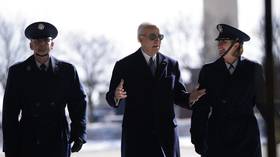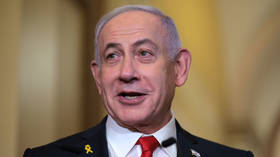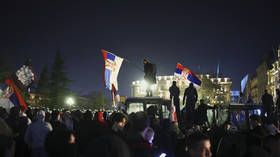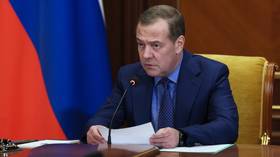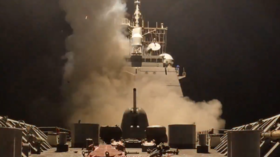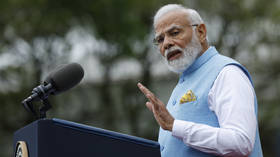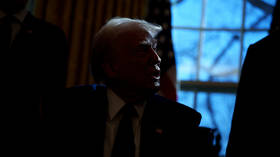Sifting for facts: 6 things we learned from Secretary Carter’s Senate testimony
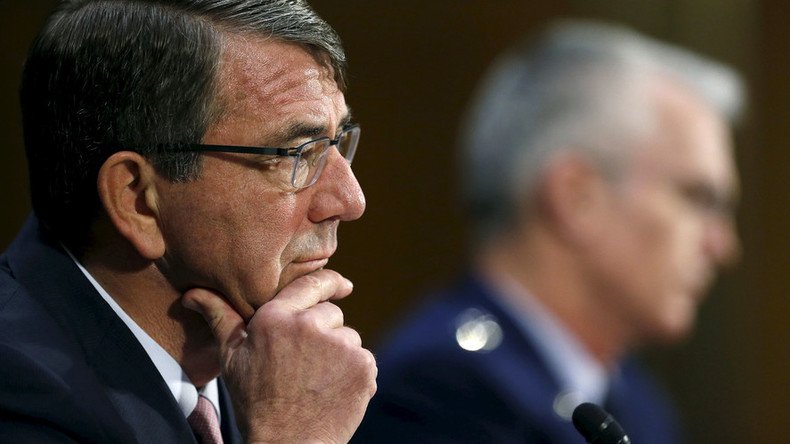
Senators have spent hours grilling the Secretary of Defense about US strategy in fighting ISIS. While the Pentagon chief stuck to the administration’s main talking points, he did make some intriguing admissions about what the US has done, and wants to do.
Ash Carter has testified before the Senate Armed Services Committee on multiple occasions in recent months. However, Tuesday’s appearance was given significant coverage by all the major US news networks. The focus of their reports was on the secretary’s sound bites – such as the quip that Islamic State (IS, formerly ISIS/ISIL) was “not contained” (which directly countered President Barack Obama’s most recent assertion), or such truisms as “the truth is, we are at war.”
There were, however, genuine insights to be found in Carter’s marathon appearance before the committee, chaired by Arizona Republican John McCain. Here are six things that caught our eye.
Wishing for (Arab) boots on the ground
Although Obama has repeatedly pointed out that the US “coalition” against IS terrorists consists of 65 countries, Carter admitted that the US is doing most of the work, while the others “must do more.”
With France, Britain and now Germany already bombing IS targets in Syria, it is unclear what more Washington could want from its European allies.
It is the Sunni Arab states in the region that “have a unique role,” Carter told the lawmakers. While the Saudis and their allies are preoccupied with fighting in Yemen at the moment, the US would really like them to send a ground expeditionary force into, say, Syria instead. If the Arabs were to assemble a force that could take the IS head on, “we would certainly welcome that,” Carter said.
Earlier in the hearing, McCain – an outspoken advocate of US ground intervention – brought up the prospect of a Turkish or even an Egyptian ground force to march on the IS capital of Raqqa.
By what right?
The “specialized expeditionary targeting force” which the US has sent to Iraq and Syria, “will also be in a position to conduct unilateral operations in Syria, in Iraq the force will operate at the invitation of the Iraqi government,” Carter told the lawmakers.
The issue of permission is an interesting one. While Washington insists that anyone fighting IS in Iraq needs the permission of the Iraqi government to do so, the rule obviously does not apply to US forces operating in Syria – as they have neither asked for, nor received, such permission from the government in Damascus.
Moreover, a major US ally in the region, Turkey, has moved a large force deep into Iraq despite emphatic opposition from the government in Baghdad. The US State Department has merely shrugged its shoulders and talked of “diplomatic dialogue” to resolve the matter.
Things are heating up on #Iraq-#Turkey border.
https://t.co/2AcYfixrTy
— IN THE NOW (@INTHENOWRT) December 9, 2015Insofar as Carter mentioned Turkey at all, it was to encourage Ankara to “do more to control its often porous border” with Syria. Turkey has become the main route for IS to import manpower and supplies while exporting oil.
Targeting tankers
While Carter said that the US has destroyed over 400 tanker trucks belonging to the terror group, Senators wanted to know why it took over a year for US airplanes to begin targeting what has been described as the “living pipeline.”
Answering the question, posed by New Hampshire Republican Kelly Ayotte, Carter argued that the US has been trying to avoid destroying Syrian infrastructure and only “peel off” the parts used by IS. Only recently was the US intelligence able to identify which oil trucks “support ISIL,” at which point US airplanes bombed them, he said.
McCain was not amused by the explanation, countering that the US knew about the oil trucks all along, but the White House made the decision not to target them. And when the bombers came, they first dropped leaflets warning the drivers to get out.
Because no footage of the US airstrikes was available, one US television station even used a video of Russian airstrikes against IS oil trucks.
What about Russia?
According to Carter, “Russia, which has publicly committed to defeating ISIL, has instead largely attacked opposition forces.” He made no mention of Russian airstrikes on the “living pipeline,” or the submarine-launched cruise missiles targeting IS forces earlier in the day.
First video: Russian subs target #ISIS in #Syria from Mediterranean https://t.co/kMrb94UoLy
https://t.co/ajiwmEdgkY
— RT (@RT_com) December 9, 2015“It’s time for Russia to focus on the right side of this fight,” Carter declared. He embellished on what that could entail a little later, discussing the need for regime change in Damascus.
'Assad first'
While Washington has bemoaned the lack of ground troops in Syria willing to take on IS, Moscow has worked with the Syrian government and the Syrian Army to do just that. Yet both the Obama administration and the Republican opposition stubbornly insist that the Syrian president Bashar al-Assad "must go” before the real fight against IS can begin.
Blame #Assad: The world according to State Department http://t.co/qYBUB4aBk3pic.twitter.com/rQuPvKBvU4
— RT (@RT_com) September 16, 2015Maine Independent Angus King, for example, accused the Syrian president of “in effect” creating IS and complained that Washington “can’t wait years for Assad to leave and to turn the guns of the opposition to ISIL.”
If the US could “work with Russia to move Assad out,” then it would have the Syrian Army and all of the opposition “except perhaps Al-Nusra” to work with, King argued, naming the Al-Qaeda affiliate.
Carter agreed, saying that Secretary of State John Kerry was working on just that. A new regime in Syria could “clear Syrian territory of radicals” and stop the war that generated IS by giving the Syrian people “the governance they deserve.”
“A political transition in Syria is essential to the durable end state of this campaign,” as Carter put it.
Make an Iraq and call it peace
The political transition envisioned by the Pentagon is to “to have [a] Syria that is once again whole,” Carter explained.
“Multi-sectarian, for sure, like all those states over there with all the complications that go with that and that we see in Iraq,” he added, “but that, as an alternative to sectarianism and the continuation of sectarian civil war? Yes.”
Asked by Florida Republican Bill Nelson whether the concept was working out in Iraq, Carter said that Prime Minister Haider al-Abadi was “committed to that kind of vision,” but whether he can actually pull it off is “obviously a difficult matter.”



